UCC members, church bodies abolish $26.2 million in medical debt for New Englanders and first responders
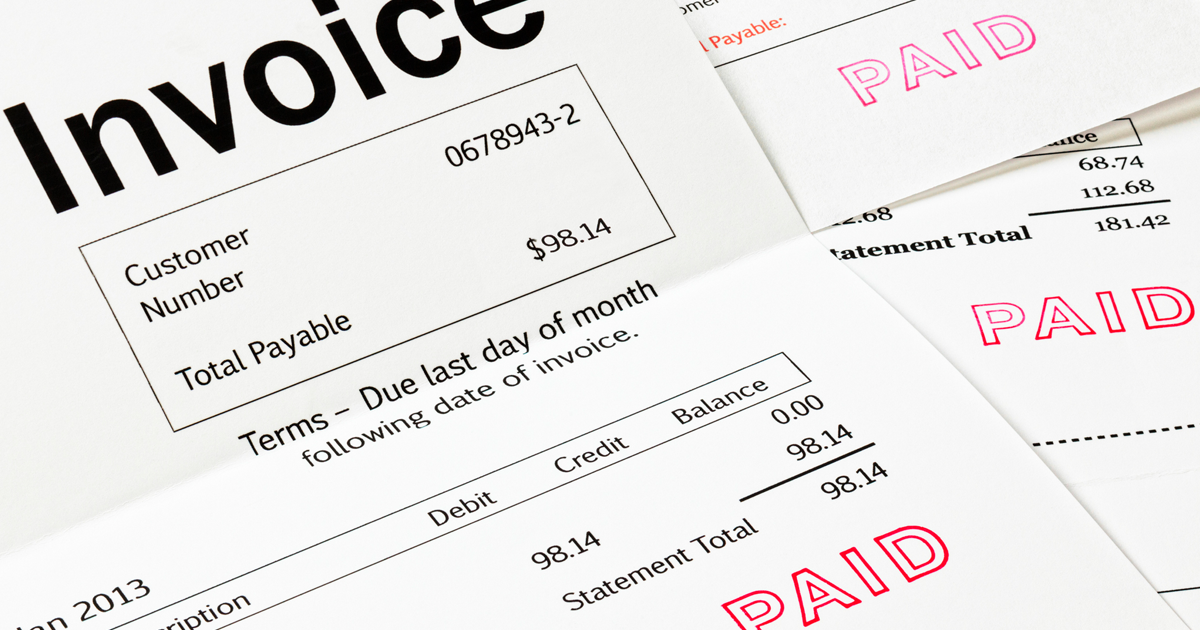 The United Church of Christ effort to abolish medical debt stands at $51.8 million with the latest buy announced in New England.
The United Church of Christ effort to abolish medical debt stands at $51.8 million with the latest buy announced in New England.
A collaborative effort by 122 United Church of Christ congregations, four Associations, and more than 100 households in the Southern New England Conference has abolished in $26.2 million in medical debt. Two separate buys benefited families in seven states and first responders around the country. All will soon be receiving letters telling them that their medical debt has been forgiven.
“Our scriptures call us to bring good news to the poor, to proclaim release to the captives, to let the oppressed go free,” said the Rev. Jocelyn Gardner Spencer, senior pastor of the United Church on the Green in New Haven, Conn. “In the midst of a pandemic that is disproportionately impacting communities of color and with widespread unemployment causing people to lose their insurance just when they may need it most, eliminating medical debt for vulnerable individuals and families is a tangible way in which we are responding to our call to make God’s love and justice real.”
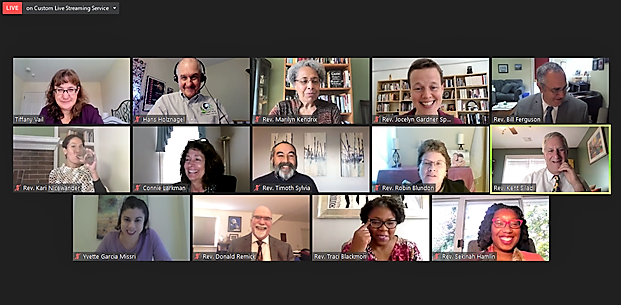 Gardner Spencer was one of the local, regional and national UCC leaders who announced the medical debt buy via Zoom on Oct. 25. A Conference-wide fundraising campaign in Connecticut, Massachusetts and Rhode Island, birthed before the pandemic, along with a contribution from the UCC National Setting, raised over $200,000. The gifts were sent to the New-York based nonprofit RIP Medical Debt, which bought up debt in August for pennies on the dollar in 65 counties in Connecticut, Massachusetts, Maine, New Hampshire, New York, Rhode Island and Vermont.
Gardner Spencer was one of the local, regional and national UCC leaders who announced the medical debt buy via Zoom on Oct. 25. A Conference-wide fundraising campaign in Connecticut, Massachusetts and Rhode Island, birthed before the pandemic, along with a contribution from the UCC National Setting, raised over $200,000. The gifts were sent to the New-York based nonprofit RIP Medical Debt, which bought up debt in August for pennies on the dollar in 65 counties in Connecticut, Massachusetts, Maine, New Hampshire, New York, Rhode Island and Vermont.
That purchase wiped out $8.4 million in medical debt for 7,175 households, with the average forgiven being $1,171.
A second purchase funneled $107,000 of the church donations into a new fund created to respond to COVID-19, and eliminated another $17.8 million in debt for 12,144 health care workers and first responders across the United States. Texas, Oklahoma, Michigan and Georgia were the top four states represented, with average debt forgiven being $1,466.
From its first buy in May, RIP’s Helping COVID Heroes Fund has already wiped out $46 million in debt for 36,662 people working on the front lines of the pandemic. The UCC is one of the first 10 organizations contributing to this fund.
‘Living the love and justice of Jesus’
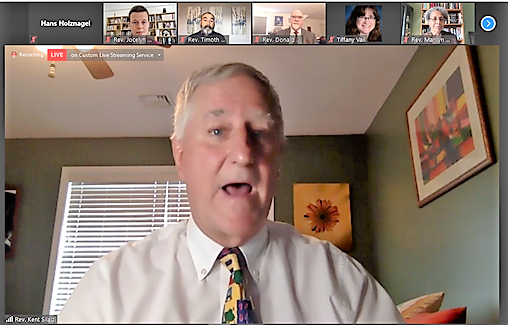 Speaking at the news conference, UCC clergy representing congregations in the three states of the Southern New England Conference said the project hoped to reach low-income debtors throughout their communities. They were astounded and grateful for the wide reach of this buy.
Speaking at the news conference, UCC clergy representing congregations in the three states of the Southern New England Conference said the project hoped to reach low-income debtors throughout their communities. They were astounded and grateful for the wide reach of this buy.
“We responded to the invitation to participate in RIP Medical Debt relief because we are centered in ‘living the love and justice of Jesus,’” said the Rev. Kent Siladi, former bridge Conference Minister in Connecticut who helped head the campaign. “When the COVID19 pandemic hit … we knew this initiative had to go forward. This is a demonstration of the power of collaboration and commitment to make an impact and a different together.”
The Rev. Timoth Sylvia, senior pastor of Newman Congregational Church UCC, Rumford, R.I., said his church voted unanimously “to join this tangible example of love and compassion that we are called to share,” by adding RIP Medical Debt to this year’s budget. The church donated 1 percent of its annual revenue, “to step out in faith to meet the needs of our neighbors.” Sylvia said.
The Rev. Bill Ferguson, senior pastor of Pilgrim Church in Duxbury, Mass., said his congregants were initially “doubting Thomases.” They had little experience with medical debt and skeptical about the potential reach of their donation. After doing research, “their eyes were opened to the impact” and they were honored to participate.
‘Med debt affects people on so many levels’
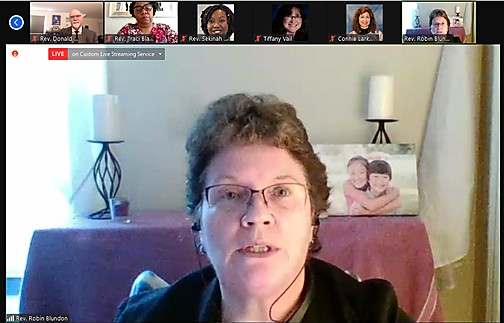 The Rev. Robin Blundon, a hospice chaplain and acting pastor of Northford Congregational Church UCC in Northford, Conn., shared the impact of her daughter Hope’s expensive medical treatments for a cleft lip and cleft palate, $650,000 the last 15 years. Hope’s eighth surgery in December was $51,000.
The Rev. Robin Blundon, a hospice chaplain and acting pastor of Northford Congregational Church UCC in Northford, Conn., shared the impact of her daughter Hope’s expensive medical treatments for a cleft lip and cleft palate, $650,000 the last 15 years. Hope’s eighth surgery in December was $51,000.
“How has this affected our life? How hasn’t it,” she said, noting that she often worked three jobs to make ends meet, didn’t take vacations, skipped buying a house and didn’t move so her daughter could be close to the specific care she needed.
“I look at it all and we are not in that group, but other people I see – my hospice patients – they are so close,” Bludon said. “It is amazing from what I have seen how that (medical debt) affects people on so many levels. I’m grateful how you have given to help people and change the lives of people you will never know.”
Rev. Kari Nicewander, senior minister of Immanuel UCC in Hartford, said the church should be involved in this work “because it affects our very bodies and causes harm to the Body of Christ.” She spoke about a conversation she had with one of her congregants, a sick woman who had to decide if she was going into debt to get vital medical treatment. Her insurance company had cut her from the plan and she didn’t have the money to pay for three expensive infusions her doctor had ordered.
“I was furious during that conversation, so angry at that company, so angry at that callous disregard for a human being. No one should choose between essential medical care and life-long debt,” Nicewander said. “And until we can eradicate a system that forces people into these nauseating situations, the church will do everything it can to eradicate those debts, and set people free from a system that holds them in chains. We must work for structural change in our health care system. But in the meantime, we must care for those whose bodies and spirits have been harmed by the system.”
‘Need to form a new economy and a new system’
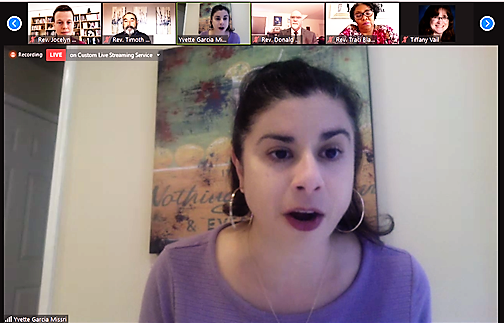 UCC Minister of Economic Justice Sekinah Hamlin said the system must be changed. The church is partnering with the Center for Responsible lending to develop a network, so “God’s people will have a future and a hope.”
UCC Minister of Economic Justice Sekinah Hamlin said the system must be changed. The church is partnering with the Center for Responsible lending to develop a network, so “God’s people will have a future and a hope.”
Yvette Garcia Missri, with the Center for Responsible Lending, said she’s seen low-income people harmed “for just trying to meet their basic needs by seeking medical treatment.” She said that medical debt is not only stressful, it’s “strongly associated with negative health consequences like poor psychological and physical health – anxiety, depression, high blood pressure – as well as foregone medical care and early mortality.” These, she said, disproportionately affect communities of color. She congratulated the group “for taking this significant and meaningful step toward achieving economic justice.”
Specific criteria were used in both debt buys. Qualifying debtors were those earning less than two times the federal poverty level; in financial hardship, with out-of-pocket expenses that are 5 percent or more of their annual income; or facing insolvency, with debts greater than assets.
A yellow envelope bearing a UCC logo is on the way to each benefiting family, with a letter naming contributing congregations and organizations. It reads: “You may never enter the doors of one of our churches, but we are the United Church of Christ and we love you. … Most importantly, you are beloved by God and your debt has been forgiven.”
‘Representing what it means to be the UCC’
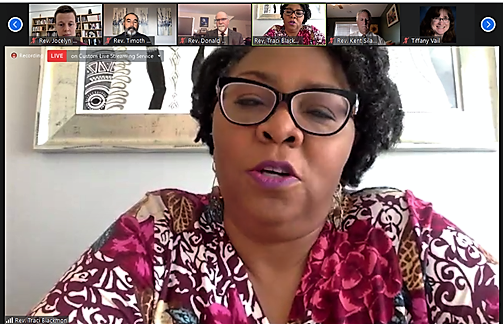 The Rev. Traci Blackmon, UCC associate general minister, has pledged the church will buy up medical debt in all six U.S. regions in which the denomination serves. On Sunday, she thanked the Southern New England Conference for funding the largest buy so far, forging ahead in spite of the pandemic.
The Rev. Traci Blackmon, UCC associate general minister, has pledged the church will buy up medical debt in all six U.S. regions in which the denomination serves. On Sunday, she thanked the Southern New England Conference for funding the largest buy so far, forging ahead in spite of the pandemic.
She was heartened to be able to help the healthcare workers and first responders. “It’s unconscionable that the people we celebrate as heroes are also struggling with medical debt,” she said, noting that while their work might be considered essential, their bodies are not.
“We are here because charity is necessary,” she said, “but we are also here because justice must come.”
Abolishing debt around the country
The church’s medical debt project began in the Great Lakes Region with a 2019 buy in Chicago, where church donations abolished $5.3 million in debt for 5,888 families on the city’s South Side.
In January 2020, the effort moved to St. Louis, in the West Central Region, where $12.9 million in medical debt was eliminated for 11,108 households in that city and St. Louis County.
This summer, in the Western Region, nine California congregations in the East Bay Area wiped out $7.4 million in medical debt for 3,539 households across the state.
Sunday’s announcement covers the New England Region. The campaign will continues through the summer of 2021 with a several more initiatives already in the works. Buy number five is in process, in Kansas and Oklahoma, with a sixth, in the UCC’s Central Atlantic Conference, the Middle Atlantic Region, covering the states of Maryland, Virginia and the District of Columbia. Next spring, the Penn West Conference is planning a buy.
The UCC is also using it as an opportunity to draw attention to what Blackmon calls “the unconscionable cost and profiteering of healthcare in the United States and their devastating impact on families, as a critical issue as we vote in the 2020 elections.”
Watch the entire Oct. 25 announcement here.
Register for an Oct. 27 webinar with RIP Medical Debt Director of Development, Scott Patton.
Related News
A Prophetic Call for Justice and Peace in Palestine
The executive leaders of the United Church of Christ have issued the following statement...
Read More‘Love is Greater Than Fear’: Regional Youth Events get to the heart of gospel message
United Church of Christ teens attending this summer’s Regional Youth Events (RYE) are...
Read MoreUCC desk calendars available to order now
Prepare for your day, month and year with the United Church of Christ desk calendar —...
Read More


